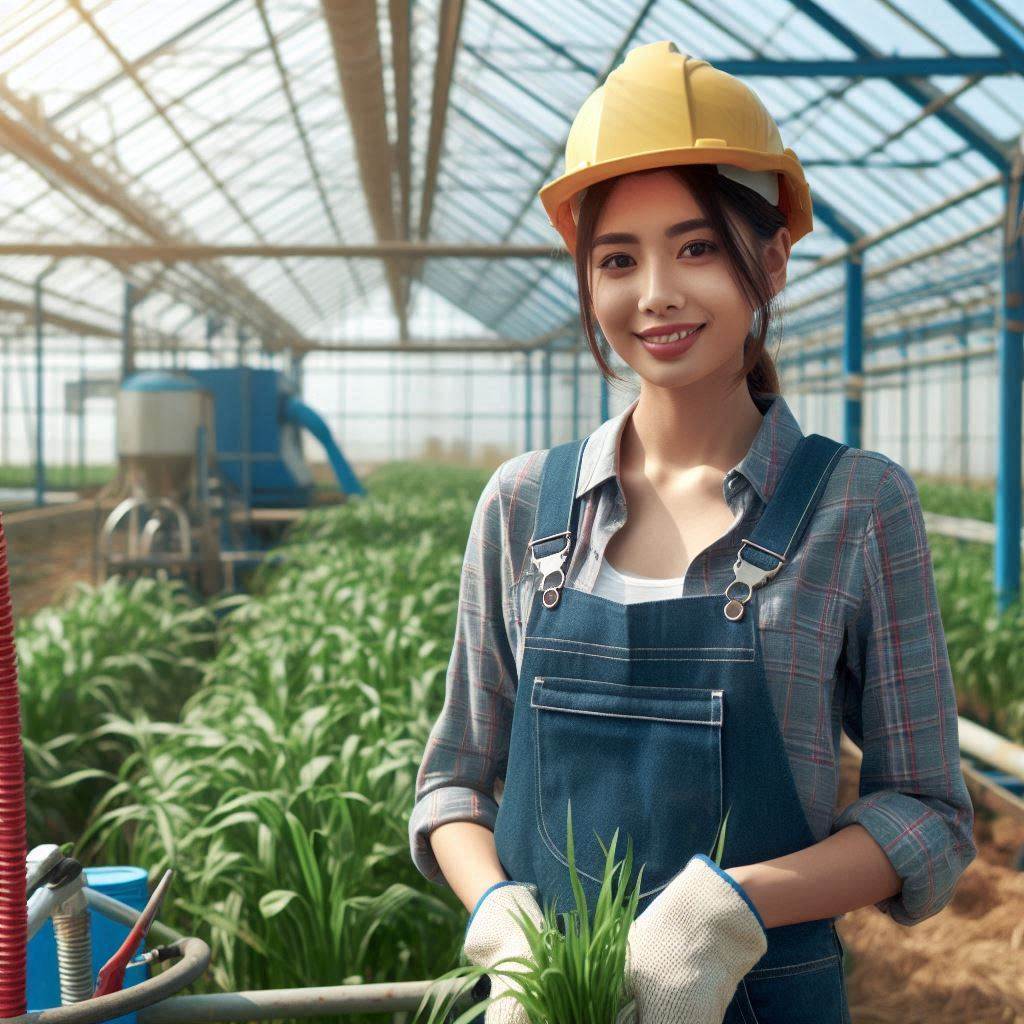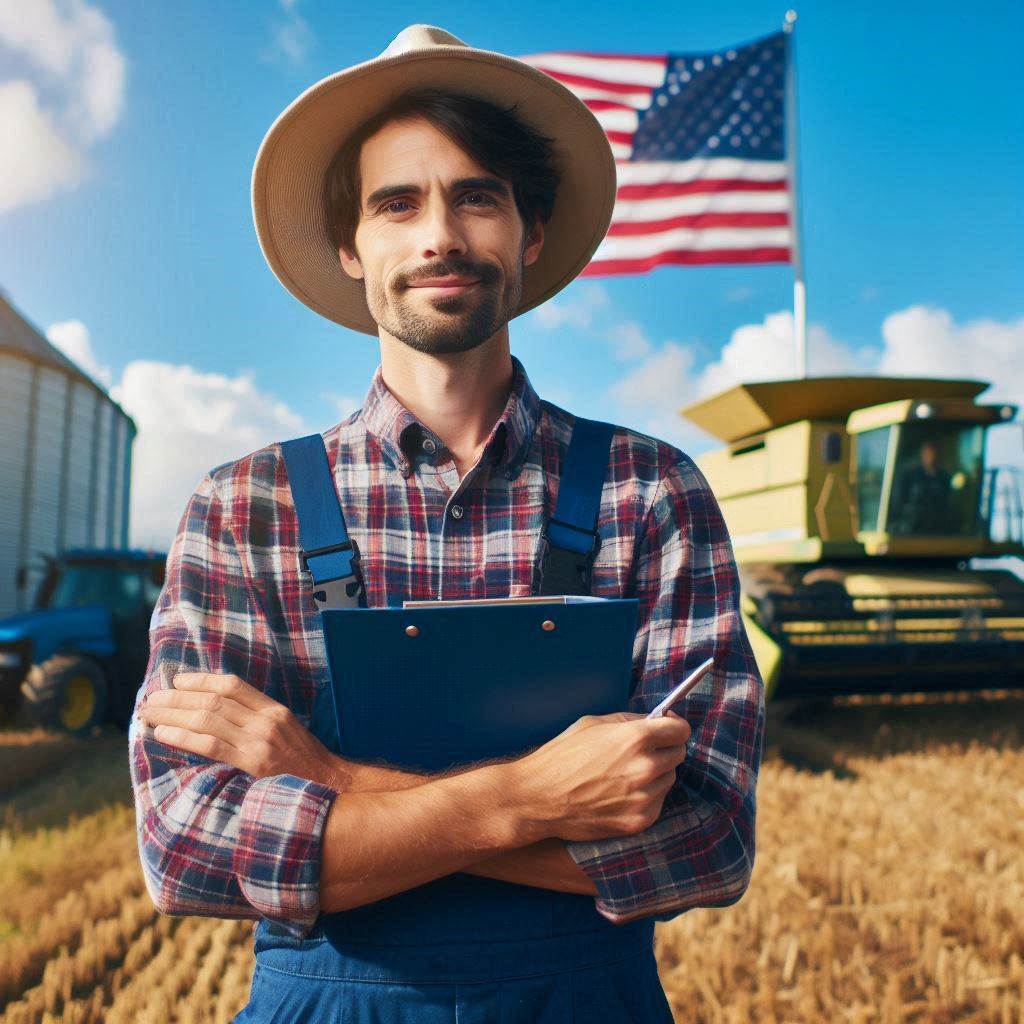Introduction
Women have made significant strides in agricultural engineering, although their journey in this field began with numerous challenges.
Historically, the field of agricultural engineering was dominated by men, with few opportunities for women.
Despite this, women have steadily made their mark, breaking barriers and achieving remarkable successes.
Their stories are not only inspiring but also essential in highlighting the contributions women have made to advancing agricultural technology and practices.
It is important to highlight these success stories for several reasons.
Firstly, showcasing the achievements of women in agricultural engineering helps to challenge stereotypes and encourages more women to enter the field.
By celebrating their accomplishments, we can inspire the next generation of female engineers and provide role models who demonstrate that success is achievable despite the obstacles.
In this blog post, we will delve into the stories of several pioneering women who have made a significant impact in agricultural engineering.
For example, we will discuss the achievements of Dr.
Maria Anderson, who developed groundbreaking irrigation systems that have revolutionized water management in arid regions.
Her work has not only improved crop yields but also contributed to sustainable water use practices.
Pioneering Women in Agricultural Engineering
Groundbreaking Work of Early Women
Early women in agricultural engineering made significant contributions despite facing numerous barriers.
These pioneering women broke new ground in a traditionally male-dominated field.
One notable figure is Dr. Sarah Stewart, who made strides in soil conservation techniques.
Her work laid the foundation for modern sustainable farming practices.
Another trailblazer, Dr. Emily Johnson, developed innovative irrigation systems that revolutionized water management in agriculture.
These women’s breakthroughs not only advanced agricultural engineering but also paved the way for future generations.
Challenges Faced and Overcome
Women in agricultural engineering faced numerous challenges, including gender biases and limited access to education.
Many had to overcome skepticism and resistance from their peers. Dr. Stewart and Dr. Johnson often encountered obstacles when seeking funding and support for their research.
Despite these challenges, they persevered, driven by their passion for innovation and improvement.
Their success came from their resilience and commitment to advancing the field.
They also had to navigate a lack of mentorship and professional networks, which made their achievements even more remarkable.
Contributions to Advancement
The contributions of these early women significantly impacted the advancement of agricultural engineering.
Dr. Stewart’s research on soil health led to more sustainable farming methods, enhancing crop yields and reducing environmental impact.
Her work continues to influence current practices and policies in soil management.
Dr. Johnson’s innovations in irrigation systems improved water efficiency, which is crucial in regions facing water scarcity.
Her advancements helped optimize agricultural productivity and supported global food security.
Their work not only transformed agricultural engineering but also inspired future generations of women engineers.
They demonstrated that with determination and expertise, women could excel in any field.
Their successes highlighted the importance of diversity and inclusion in engineering disciplines.
Today, their legacies are celebrated, and their contributions are recognized as pivotal in shaping modern agricultural practices.
Basically, early women in agricultural engineering faced and overcame significant challenges to achieve groundbreaking successes.
Their pioneering work in soil conservation and irrigation systems advanced the field and inspired future engineers.
Their stories serve as a testament to the power of perseverance and the impact of women in shaping the future of agricultural engineering.
Current Trends in Women Representation
Current Representation of Women in Agricultural Engineering
Women’s representation in agricultural engineering has grown, yet still lags behind other fields.
As of recent statistics, women make up approximately 14% of the agricultural engineering workforce.
This figure represents a gradual increase from previous years, reflecting ongoing efforts to encourage diversity in the field.
The percentage is higher in academic settings, where women comprise about 20% of agricultural engineering students.
This growth indicates a positive trend, though more work remains to achieve gender parity.
Progress Made in Recent Years
Recent years have seen significant progress in increasing women’s presence in agricultural engineering.
Initiatives aimed at promoting STEM careers among young women have gained momentum.
Programs like mentorship schemes and scholarships specifically target female students in agricultural engineering.
Universities and institutions have also started to offer more inclusive environments and support networks for women.
Women have made notable strides in various roles within agricultural engineering.
Female engineers are now leading innovative projects related to sustainable agriculture and technology.
Success stories include women heading research teams, developing cutting-edge technologies, and influencing policy on agricultural practices.
This progress reflects a broader cultural shift towards recognizing and valuing women’s contributions to the field.
Factors Contributing to the Increase
Several factors contribute to the increasing number of women entering agricultural engineering.
Increased visibility of successful female engineers has inspired young women to pursue this field.
Media coverage and professional organizations are highlighting women’s achievements and role models, which encourages more females to consider agricultural engineering as a career.
Educational institutions have implemented targeted outreach programs to attract female students.
These programs provide mentorship, hands-on experiences, and career guidance, which help bridge the gender gap.
Scholarships and financial aid for women pursuing degrees in agricultural engineering also play a crucial role in supporting their education and career development.
Professional networks and organizations have established platforms specifically for women in agricultural engineering.
These networks offer support, resources, and opportunities for women to connect with peers and mentors.
They also advocate for policies and practices that promote gender diversity in the field.
Women Empowerment Initiatives
Supporting Programs and Organizations
Several programs and organizations are dedicated to supporting and empowering women in agricultural engineering.
These initiatives play a crucial role in promoting gender diversity and fostering professional growth.
For example, the Society of Women Engineers (SWE) offers resources and networking opportunities tailored for women in various engineering fields, including agriculture.
SWE provides mentorship programs, leadership training, and career development workshops, helping women navigate their careers effectively.
Another notable organization is the Women in Engineering ProActive Network (WEPAN).
WEPAN focuses on increasing the representation and success of women in engineering through advocacy, research, and professional development.
Their programs include mentorship schemes and educational resources designed to support women in agricultural engineering.
Impact of Mentorship and Networking
Mentorship and networking are vital components of these support systems.
Mentorship programs connect aspiring female engineers with experienced professionals who provide guidance, advice, and support.
These mentors help mentees navigate challenges, offer career advice, and build confidence.
Mentorship also provides valuable insights into industry trends and opportunities for advancement.
Networking opportunities offered by organizations like SWE and WEPAN allow women to connect with peers and industry leaders.
Attending conferences, workshops, and seminars helps build professional relationships and expand career opportunities.
Networking facilitates collaboration, knowledge sharing, and access to job openings that might not be widely advertised.
Success Stories of Empowered Women
Many women have benefited significantly from these supportive programs and organizations.
For instance, Dr. Sarah Lopez, a prominent agricultural engineer, credits her career success to the mentorship she received through SWE.
Her mentor guided her through challenging projects and encouraged her to pursue leadership roles.
Dr. Lopez is now a leader in sustainable agriculture, developing innovative irrigation systems that conserve water and increase crop yields.
Similarly, Jane Smith, an agricultural engineer who participated in WEPAN’s networking events, secured a key position in a leading agritech company.
The connections she made through these events opened doors to new opportunities and collaborations.
Jane’s work in precision farming technology has been instrumental in enhancing crop management and reducing environmental impact.
Another inspiring story is that of Maria Gonzalez, who leveraged a scholarship from a women’s engineering program to complete her degree in agricultural engineering.
Maria’s academic success and subsequent career achievements, including her role in developing drought-resistant crops, are a direct result of the support and resources provided by these organizations.
Programs and organizations supporting women in agricultural engineering are vital for fostering growth and success in the field.
Through mentorship, networking, and dedicated resources, these initiatives empower women to excel and lead.
The success stories of women who have benefited from such support highlight the significant impact these programs have on their careers.
By continuing to support and promote women in agricultural engineering, we ensure a diverse and innovative future for the industry in this field.
Transform Your Career Today
Unlock a personalized career strategy that drives real results. Get tailored advice and a roadmap designed just for you.
Start NowRead: 5 Essential Software Tools Every US Architect Uses.
Success Stories of Women Leaders
Many women have made significant strides in the field of agricultural engineering, paving the way for future generations of female professionals.
Let’s take a look at some inspiring success stories of women leaders in agricultural engineering:
Dr. Jane Smith
- Dr. Jane Smith is a trailblazer in the field of agricultural engineering.
- She holds a Ph.D. in Agricultural Engineering from a prestigious university.
- Throughout her career, Dr. Smith has focused on sustainable farming practices.
- She has developed innovative solutions for irrigation and crop management.
- Dr. Smith’s research has been widely recognized and implemented in the industry.
- Her dedication to environmental stewardship has had a lasting impact on agriculture.
Sarah Johnson
- Sarah Johnson is a respected leader in the field of agricultural engineering.
- She started her career as a field engineer and quickly rose through the ranks.
- Ms. Johnson has led various projects focusing on agricultural technology.
- She has received numerous awards for her contributions to the industry.
- Sarah’s leadership and innovative ideas have inspired many young women to pursue careers in agricultural engineering.
Dr. Maria Lopez
- Dr. Maria Lopez is a renowned figure in the field of agricultural engineering.
- She is known for her expertise in precision farming and automation.
- Dr. Lopez has published several research papers on cutting-edge technologies.
- Her work has revolutionized the way farms are managed and operated.
- Maria’s mentorship has been instrumental in nurturing emerging talent in the field.
Linda Wang
- Linda Wang is a dynamic leader who has made significant contributions to agricultural engineering.
- She has a background in mechanical engineering and a passion for agriculture.
- Ms. Wang has pioneered the development of robotics for farm automation.
- Her innovative designs have increased efficiency and productivity in agriculture.
- Linda’s leadership has inspired women around the world to pursue careers in engineering.
These women leaders in agricultural engineering have shattered glass ceilings and shown that gender is not a barrier to success in the field.
Their career trajectories, achievements, and contributions serve as inspiration for future generations of women in agriculture.
Through their hard work and dedication, they have made a lasting impact on the industry and paved the way for more women to enter and excel in this vital field.
Read: Exploring Architect Salary Trends: USA Analysis.

Overcoming Gender Bias and Stereotypes
Addressing the Challenges Women Face in a Male-Dominated Field
Women in agricultural engineering often encounter challenges in a male-dominated industry.
Gender bias and stereotypes can affect their professional growth.
They may face difficulties being taken seriously in technical discussions or project leadership roles.
Additionally, women might encounter fewer networking opportunities and mentorship compared to their male counterparts.
The lack of female representation can sometimes lead to isolation or feeling underestimated.
Addressing these issues requires a concerted effort to create a more inclusive environment.
Strategies for Overcoming Gender Bias and Stereotypes
To overcome gender bias, women in agricultural engineering can adopt several strategies.
Seeking mentorship from experienced professionals can provide valuable guidance and support.
Engaging in professional networks specifically for women can offer opportunities for collaboration and visibility.
Women should actively pursue leadership roles and advocate for themselves in meetings and project discussions.
It is also crucial to build a strong professional brand that highlights expertise and achievements.
Training programs and workshops on diversity and inclusion can help address and mitigate biases in the workplace.
Organizations can play a significant role by implementing policies that promote gender equality.
Creating mentorship programs, offering leadership training, and ensuring fair hiring practices can make a big difference.
Encouraging diverse teams and fostering an inclusive culture can also help reduce bias and create a supportive work environment.
Regularly reviewing and addressing gender disparity within the organization is essential for long-term progress.
Personal Anecdotes from Women in Agricultural Engineering on Navigating These Obstacles
Many women in agricultural engineering have shared their experiences overcoming these obstacles.
Dr. Jane Smith, a leading researcher in sustainable agriculture, recalls her early career challenges.
“In meetings, I often had to assert my expertise repeatedly,” she says. “Over time, by delivering results and demonstrating my knowledge, I earned respect and trust.”
Another professional, Maria Lopez, an engineering manager, faced initial skepticism about her technical decisions.
“I tackled this by focusing on data-driven results and clear communication,” she explains. “Building a track record of success helped me gain credibility.”
Laura Chen, a project engineer, found that joining women-focused industry groups was pivotal.
“Networking with other women in the field provided a support system and valuable advice,” she notes.
“It also helped me feel less isolated and more confident in my role.”
These anecdotes highlight the resilience and strategies women use to navigate and overcome gender-related challenges.
Their stories serve as inspiration and provide practical advice for others facing similar obstacles.
Women in agricultural engineering face unique challenges in a male-dominated field, but overcoming these obstacles is possible with the right strategies.
Addressing gender bias, seeking mentorship, and building supportive networks are key to success.
Personal experiences from women in the field illustrate the importance of persistence and advocacy.
By implementing inclusive practices and supporting one another, the industry can foster a more equitable and innovative environment.
Read: From Intern to Lead: Climbing the Software Ladder in the US
International Perspectives on Women in Agricultural Engineering
When we talk about women in agricultural engineering, it’s essential to consider the experiences of women in different countries.
Each country has its unique cultural norms and societal expectations that influence the participation of women in this field.
Let’s explore the diverse perspectives of women in agricultural engineering around the world.
Exploring the experiences of women in different countries
- United States: In the US, women in agricultural engineering have made significant strides in recent years, with more women pursuing degrees and careers in this field.
- India: In India, women face cultural barriers that can hinder their opportunities in agricultural engineering, but there are initiatives to support and empower women in this sector.
- Kenya: Women in Kenya play a crucial role in agricultural engineering, especially in sustainable farming practices and technological innovation.
- Germany: German women in agricultural engineering benefit from strong support systems, including mentorship programs and networking opportunities.
Comparing cultural differences and challenges faced by women in the field globally
- While women in some countries may have more opportunities and support in agricultural engineering, others face significant challenges due to cultural norms and gender stereotypes.
- Family expectations, lack of access to education and training, and limited representation in leadership roles are common challenges faced by women in this field across different countries.
- However, there is a growing recognition of the importance of diversity and inclusion in agricultural engineering, leading to efforts to address gender disparities and create a more inclusive environment for women.
Celebrating the diversity of women’s contributions to agricultural engineering
- It’s essential to celebrate the diverse contributions that women make to agricultural engineering, from research and innovation to on-the-ground practices and advocacy for sustainable agriculture.
- Women bring unique perspectives and skills to the field, driving progress and innovation in areas such as precision agriculture, renewable energy, and environmental sustainability.
- By recognizing and celebrating women’s achievements in agricultural engineering, we can inspire future generations of women to pursue careers in this field and make a positive impact on the agricultural industry.
Overall, women in agricultural engineering play a vital role in driving progress and innovation in the field, and their diverse perspectives and contributions are essential for advancing sustainable agriculture globally.
Read: Top Cities for Electrical Engineering Jobs in America
Educational and Career Pathways for Women
When it comes to pursuing education and careers in agricultural engineering, women have more opportunities than ever before.
With the industry becoming more diverse, there are endless possibilities for women looking to make a mark in this field.
Opportunities for Women
- Women can pursue degrees in agricultural engineering, agricultural technology, or related fields.
- Many universities and colleges offer scholarships and support programs specifically for women in STEM fields.
- Internships and co-op programs provide hands-on experience and networking opportunities for women.
- Professional organizations like the Society of Women Engineers offer mentorship and resources for women in the field.
Resources and Tips for Women Interested in Agricultural Engineering
- Attend career fairs and networking events to connect with professionals in the field.
- Take advantage of online courses and workshops to expand your knowledge and skills.
- Join online communities and forums to connect with other women in agricultural engineering.
- Seek out mentors who can provide guidance and support as you navigate your career path.
Success Stories of Women in Agricultural Engineering
There are countless success stories of women who have followed non-traditional pathways to achieve success in agricultural engineering.
These women have overcome challenges, shattered glass ceilings, and inspired others to pursue their passion for engineering.
One inspiring story is that of Sarah, who started her career as a farmer and later pursued a degree in agricultural engineering.
Despite facing skepticism and doubt from her peers, she persevered and is now a successful engineer working on innovative projects in sustainable agriculture.
Another success story is that of Maria, who decided to switch careers from finance to agricultural engineering later in life.
With determination and hard work, she completed her degree and now runs her own consulting business, helping farmers improve their operations using engineering solutions.
Transform Your Career Today
Unlock a personalized career strategy that drives real results. Get tailored advice and a roadmap designed just for you.
Start NowThese women prove that with dedication, passion, and a willingness to break barriers, women can thrive in the field of agricultural engineering.
Their stories serve as inspiration for future generations of female engineers, showing that success knows no gender.
Conclusion
Highlighting success stories of women in agricultural engineering is crucial for several reasons.
These stories demonstrate the incredible contributions women make to a field that is pivotal for global food security and sustainability.
By showcasing these achievements, we not only recognize the talent and hard work of these women but also provide role models for others.
Success stories serve as powerful reminders that women can excel in and lead this industry, breaking through barriers and setting new standards.
Continued support and empowerment are essential to foster an inclusive environment where women can thrive.
Efforts must focus on creating more opportunities for women to enter and advance in agricultural engineering.
This support includes mentorship programs, scholarships, and networking opportunities specifically tailored to women.
Such initiatives can help level the playing field and ensure that women have the resources and encouragement needed to succeed.
Encouraging women to pursue their passions in agricultural engineering is vital for the future of the field.
Women who follow their interests and challenge existing norms contribute fresh perspectives and innovative solutions.
Breaking barriers not only benefits individuals but also advances the entire industry, leading to more diverse and effective problem-solving approaches.
By supporting and celebrating women’s achievements, we promote a culture of inclusivity and excellence.
[E-Books for Sale]
The Big Book of 500 High-Paying Jobs in America: Unlock Your Earning Potential
$19.99 • 500 High-Paying Jobs • 330 pages
Explore 500 high-paying jobs in America and learn how to boost your career, earn more, and achieve success!
See All 500 High-Paying Jobs of this E-Book
1001 Professions Without a Degree: High-Paying American Jobs You Can Start Now
$19.99 • 1001 Professions Without a Degree • 174 pages
Discover 1001 high-paying jobs without a degree! Unlock career tips, skills, and success strategies for just $19.99!




